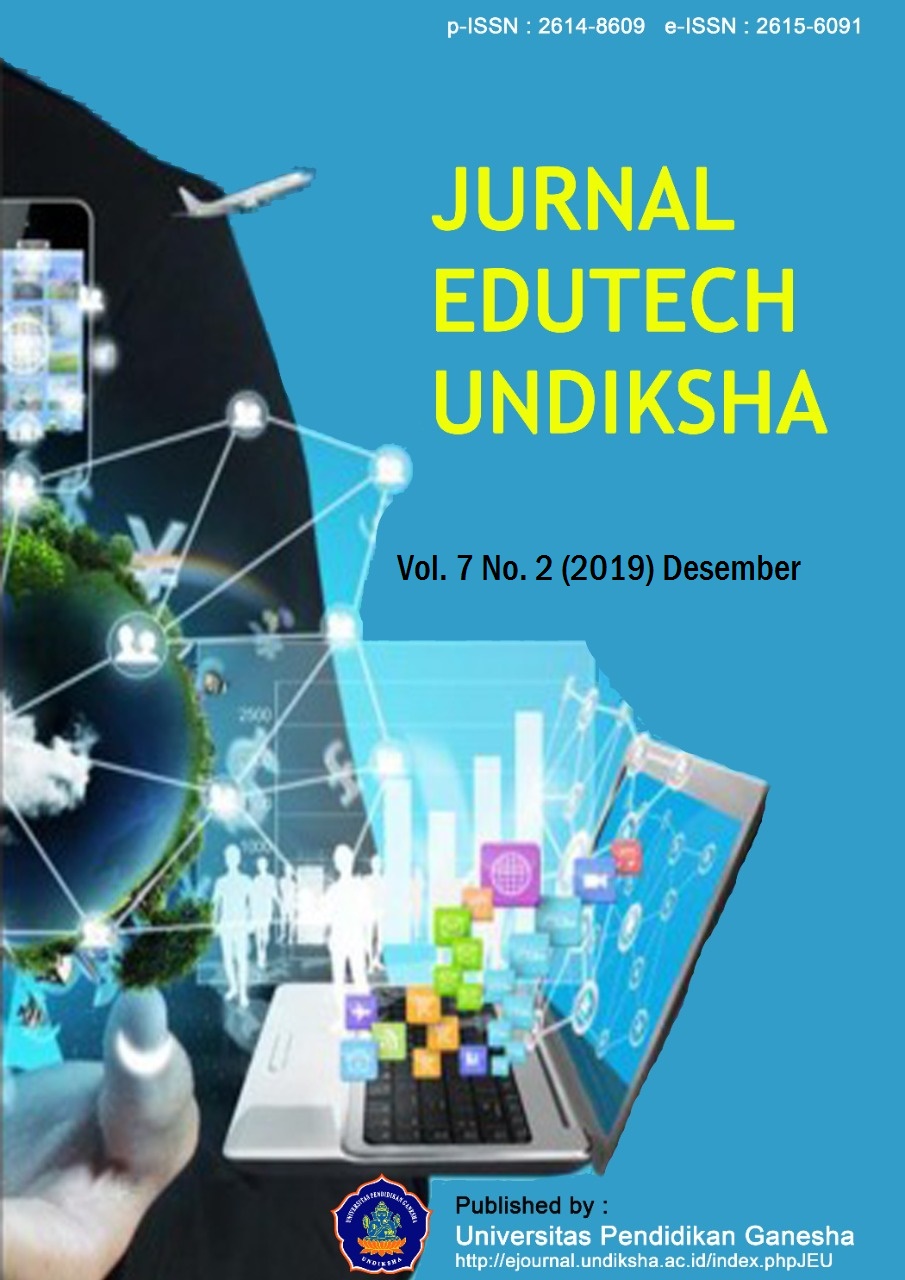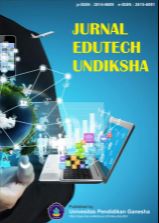PENGEMBANGAN E-KOMIK DENGAN MODEL ADDIE UNTUK MENINGKATKAN MINAT BELAJAR TENTANG PERJUANGAN PERSIAPAN KEMERDEKAAN INDONESIA
DOI:
https://doi.org/10.23887/jeu.v7i2.23159Abstract
Permasalahan yang terjadi di kelas V SD Negeri 5 Kampung baru adalah kurangnya minat belajar siswa pada materi Persiapan Kemerdekaan Indonesia dengan rata-rata hasil pretest minat belajar siswa 26,17 dari nilai maksimal yaitu 70. Penelitian ini bertujuan untuk (1) Untuk mendeskripsipkan rancang bangun pengembangan media e-komik, (2) Untuk mendeskripsikan hasil validasi pengembangan media e-komik, (3) Untuk mengetahui efektifitas media e-komik dengan model ADDIE untuk meningkatkan minat belajar siswa tentang perjuangan persiapan kemerdekaan indonesia di kelas V SD Negeri 5 Kampung Baru. Analisis data menggunakan analisis deskriptif kualitatif, kuantitatif dan statistik inferensial / induktif uji-t dan model pengembangan yang digunakan adalah model ADDIE. Validitas media telah diuji coba kepada ahli desain pembelajaran, media pembelajaran, uji coba perorangan, kelompok kecil dan uji coba lapangan Untuk hasil validitas pengembangan media e-komik untuk ahli desain pembelajaran, ahli media pembelajaran, uji coba perorangan, uji coba kelompok kecil dan uji coba lapangan secara berurutan yaitu 95,83%, 92,75%, 95%, 93,05%, dan 91,30%. Hasil uji efektivitas yang dianalisis dengan teknik statistik inferensial (uji-t) mendapatkan hasil rata-rata pretest (26,17) < hasil rata-rata posttest (63,96). Setelah dilakukan perhitungan secara manual dengan menggunakan uji-t didapatkan hasil yang menunjukkan thitung (51,49) > dari ttabel (2,45) sehingga H0 ditolak dan H1 diterima artinya Terdapat efektivitas dalam pemanfaatan E-komik Model ADDIE Tentang Persiapan Kemerdekaan Indonesia pada materi Persiapan Kemerdekaan Indonesia kelas V di SD Negeri 5 Kampung Baru tahun ajaran 2018/2019.
Kata-kata kunci: pengembangan, e-komik, minat belajar
The aim of this result is about the problem in V class at SD Negeri 5 Kampung Baru is the lack of interest in learning of preparation for Indonesian independence with the result in pretest with average 26,17 from the maximal is 70. The aim of this result is (1) to describe the development of e-comic design, (2) to describe the validation result about the development of media e-comic design, (3) to know about the effectiveness of media e-comic with ADDIE model to increase the lack of learning about fighter of freedom in Indonesian in V class SD Negeri 5 Kampung baru. The analysis data using descriptive quantitative, qualitative and statistic inferensial/ inductive t-test and the development design using ADDIE design. The validation media already trying for the expert of the learning design, learning design, individual trials, small group and field trials for the validity result of the development of the e-comic design for the expert learning design, the expert learning design, individual trials, small group trial and field trials with the sequence is 95,83%, 92,75%, 95%, 93,05% and 91,30%. The result of the effectivity with the analysis in statistic technique inferential (ttest) is (26,17)< the average posttest result (63,96). After manual counting with t-test the result is (51,49)>from ttable (2,45) so that HO rejected and H1 accepted means there is activities in utilization E-comic models ADDIE about the preparation indonesian independent V class at SD Negeri 5 Kampung baru 2018/2019
Keywords: development, e-comic, interest to learn
Downloads
Published
How to Cite
Issue
Section
License
Authors who publish with the Jurnal EDUTECH Undiksha agree to the following terms:
- Authors retain copyright and grant the journal the right of first publication with the work simultaneously licensed under a Creative Commons Attribution License (CC BY-SA 4.0) that allows others to share the work with an acknowledgment of the work's authorship and initial publication in this journal.
- Authors are able to enter into separate, additional contractual arrangements for the non-exclusive distribution of the journal's published version of the work (e.g., post it to an institutional repository or publish it in a book), with an acknowledgment of its initial publication in this journal.
- Authors are permitted and encouraged to post their work online (e.g., in institutional repositories or on their website) prior to and during the submission process, as it can lead to productive exchanges, as well as earlier and greater citation of published work. (See The Effect of Open Access)














